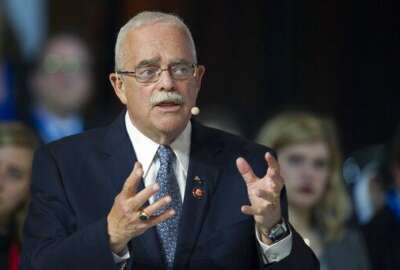
Number of feds who telework regularly went up in 2020 but not as much as expected
In today's Federal Newscast, while COVID-19 drove a majority of federal workers out of the office in 2020, new data from the Office of Personnel Management show...
To listen to the Federal Newscast on your phone or mobile device, subscribe in PodcastOne or Apple Podcasts. The best listening experience on desktop can be found using Chrome, Firefox or Safari.
- The number of federal employees who teleworked regularly in 2020 went up, but not by as much as you might think. While COVID-19 drove a majority of federal workers out of the office in 2020, new data from the Office of Personnel Management shows the increase in teleworking wasn’t as dramatic as expected. In its annual report to Congress released late last month, OPM said 50% of all federal employees were eligible to telework and 90% of them did telework regularly in 2020. Overall, 45% of all federal employees teleworked in 2020. Additionally, 72% of all agencies met their telework goal. Fiscal 2021 data is not yet available.
- Agencies must begin deciding how many interns they want to bring on this year. In fact they have less than a month to come up with their plans for recruiting from a diverse pool of candidates and how many interns they plan to hire through the Pathways Program. The Office of Personnel Management said agency plans should include job titles, the series and grades of the interns, whether the job would fill a mission critical occupation and the total number of Pathways hires expected in 2022. OPM is asking for agencies to submit the data by February 1st.
- A federal court in Texas has barred the Navy from taking action against 35 Navy special operators who’ve refused to get vaccinated against COVID-19. All of the sailors who sued said they object to the vaccine on religious grounds, and almost all of them have been denied. Judge Reed O’Connor said the Navy’s accommodation process violates their sincerely held beliefs. In the court’s view, that’s partly because the process is just “theater” and the Navy hasn’t approved a religious exception for any vaccine in the past seven years. (Federal News Network)
- The Navy’s Ready Reserve has 3,000 service members still not vaccinated against COVID-19. The Navy told Ready Reserve members that they needed to be fully vaccinated by Dec. 28, 2021. The Ready Reserve has about 59,000 members. The Navy granted nine temporary medical and 44 administrative exemptions. About 280 members requested religious accommodations. Those are unlikely to be granted considering all of the military services have denied thousands of religious exemption requests. (Federal News Network)
- Scientists at Walter Reed said they are seeing positive results on a vaccine that could protect against multiple virus variants. A series of preclinical study results show that a COVID-19 vaccine developed at Water Reed elicits a potent immune response and provides broad protection against variants of concern. The pan-coronavirus vaccine has been shown to induce potent antibody responses in non-human primates. The vaccine entered phase one human trials in April last year and early analyses is expected to conclude this month. Those results will provide more insights into whether the vaccine’s initial results will carry over into humans.
- A new Coast Guard civilian took over an intelligence post. The Coast Guard named Jeffrey Radgowski as deputy assistant commandant for intelligence. The job basically oversees the policy and operations, and making sure they align with intelligence activities of the Department of Homeland Security. Radgowski becomes a member of the Senior Executive Service, after having served the Coast Guard for some 30 years as a commissioned officer. He was the first Coast Guard attaché in Moscow, working on issues in the arctic.
- Two agencies are facing questions about their plans for overseeing the cybersecurity of the transportation sector. In a bipartisan letter, 10 senators pressed DHS Secretary Alejandro Mayorkas and Transportation Secretary Pete Buttigieg on their joint cybersecurity efforts. DHS and DOT are co-Sector Risk Management Agencies for critical transportation infrastructure. The senators want to know how they’re helping transportation companies and sharing information about cyber threats. They said the agencies may need a new sector-specific plan, as it was last updated in 2015.
- A powerful regulatory agency is throwing its weight behind calls to patch a critical software vulnerability. The Federal Trade Commission is warning companies to patch the Log4j vulnerability or face potential legal action. The FTC said the bug in the popular Java logging software package poses a severe risk to millions of consumer products. The agency said it will use its full legal authority to pursue companies that don’t take reasonable steps to protect customer’s data by patching Log4j, or any similar known vulnerabilities in the future.
- The departments of Agriculture and Justice teamed up to protect farmers, ranchers and other agricultural producers from monopolies and other unfair practices. The agencies will work together to develop a portal where farmers can submit complaints about violations of antitrust laws such as the Packers and Stockyards Act. USDA will refer potential violations to DOJ’s antitrust division. DOJ and USDA will also combine resources to highlight where Congress can modernize antitrust toolkits.
Copyright © 2024 Federal News Network. All rights reserved. This website is not intended for users located within the European Economic Area.
Eric White
Eric White is news anchor and Federal Drive producer at Federal News Network.
Follow @FEDERALNEWSCAST
Related Stories
GAO finds agencies mostly managed telework network security with a few holes
Related Topics
Agriculture Department
All News
antitrust laws
Biden administration
Coast Guard
Covid-19
COVID-19 vaccine
COVID-19 vaccine hesitancy
COVID-19 vaccine mandate
cyber attacks
Department of Homeland Security
Federal Drive
Federal Newscast
Federal Trade Commission
Jeffrey Radgowski
Justice Department
lawsuit
Log4j
Management
National & World Headlines
Office of Personnel Management
remote work
Technology
telework
Tom Temin
Transportation Department
Walter Reed National Military Medical Center
Workforce
Workforce Rights/Governance





